Louise Beavers was born in Cincinnati, Ohio, March 8, 1902. The African-American actress is best remembered as the original Delilah from 1934’s Imitation of Life and for the large number of maid roles played throughout her career both before and after that wasted breakthrough.
Louise Beavers was a trailblazer for black movie actors, but along the way she also dealt with a good deal of backlash over the subservient roles she played and the often insulting positions in which her characters were placed.
Beavers herself resented such criticism.
As early as 1935 she told Baltimore Afro-American journalist Lula Jones Garrett, “As long as the plays are being written and produced by whites for whites, there will be the same chance for criticism. The only remedy is for such plays as would meet popular favor to be produced by us.”
In 1946 Beavers was one of a dozen black performers asked to respond to plans outlined by NAACP secretary Walter White for establishing a Hollywood bureau of the organization. The replies included a good deal of resentment over the idea of Hollywood outsiders riding into town to supervise a profession in which they had no direct experience.
Beavers, after naming herself as, “the third Negro woman in this country to [ever] have my face on the screen,” comments:
”We do not have to be led by anyone taking our hands and leading us to the studios. Actors and actresses are all Dr. Jekylls and Hydes. We play a role and then we forget it. It is not a matter of degrading the Negro race. I have seen many of our white friends play roles of different periods and classes—and often they have to use dialect, even as we sometimes do.
The parts that Louise Beavers played in movies of the 1930s were the only parts available for black women. Movies were a mass product produced by big companies to sell directly to a mostly white customer. No matter what you may think of the roles she played, Louise Beavers was one of the most important players in the early black Hollywood experience. If step one was just being seen, Beavers pushed further in standing out and accomplished much in establishing a career lasting 33 years.

Beavers has a bit more flash, despite the domestic background, as Madame Nellie LaFleur in Bullets or Ballots (1936)
When she was eleven Louise Beavers came to California with her parents after her mother fell ill and the family moved from Cincinnati to Pasadena. Louise graduated from Pasadena High School in 1920 and found work in domestic service as personal maid to film star Leatrice Joy.
Joy was then at her greatest fame starring for Cecil B. De Mille during the same period which would also see her briefly become Mrs. John Gilbert. Two decades later, long after Miss Joy had stopped regularly appearing in films, Louise Beavers appeared in De Mille’s Reap the Wild Wind (1942), her only time working for the legendary director.
 In her spare time Louise was part of a group of sixteen amateur performers from the Los Angeles area who called themselves the “Lady Minstrels.” She was discovered, either by someone from Universal Studio or Charles Butler of the Central Casting Bureau according to varying reports, in 1926 when they staged a show in a downtown theatre. She made her movie debut* playing a bit in Universal’s Uncle Tom’s Cabin (1927).
In her spare time Louise was part of a group of sixteen amateur performers from the Los Angeles area who called themselves the “Lady Minstrels.” She was discovered, either by someone from Universal Studio or Charles Butler of the Central Casting Bureau according to varying reports, in 1926 when they staged a show in a downtown theatre. She made her movie debut* playing a bit in Universal’s Uncle Tom’s Cabin (1927).
*The IMDb lists Louise Beavers’ first movie as 1923’s The Gold Diggers but my guess is that this is due to some confusion over her having later appeared in 1929’s Gold Diggers of Broadway. While Louise claims she did not appear in Uncle Tom’s Cabin because she was considered too young at the time, the film still exists and people have reported seeing her in it. Uncle Tom’s Cabin is likely her first movie appearance.
Her first few film appearances were silent, but her career would really pick up steam from the time of her first talkie.
Speaking of voice, period newspapers, both black and white, made sure to let us know she didn’t really sound like what we heard in the theaters. “She has no ‘Ah, hon’y’ accent,” wrote Lula Jones Garrett for the Baltimore Afro-American, while Eileen Creelman of the The New York Sun described her voice as soft, “her accent straight Californian.” Both journalists were reporting in the swirl of acclaim following Beavers’ stand out performance in Imitation of Life.
Louise Beavers first gained widespread notice in Coquette (1929), the title from which Mary Pickford somewhat controversially won her Academy Award for Best Actress. Beavers was mostly in the background as Julia, the Besant family cook and house maid, but emerged to share one of Pickford’s best scenes as the then 36-year-old screen legend is cradled for comfort in the lap of her former nanny.
It’s even more disturbing when you realize Beavers is actually ten years younger than Pickford.
The part set the standard for the type roles Louise Beavers would play for the rest of her career. Her most common credit was “maid,” though if a black actor had a small part in a 1930s film calling for a wife there was a good chance that it would be Beavers who would pop in with a line or two to serve the role.
Beavers got to break away from the domestic role in Ladies of the Big House (1931) where she played, you guessed it, a convict in a women’s prison. As the bulk of this Paramount title takes place behind bars it actually somewhat refreshing to have not only Beavers on the scene as Ivory, but an entire group of black prisoners. She is without doubt their leader.
Ivory makes friends with the star of the film, Sylvia Sidney, when Sidney’s character is suffering a low moment soon after being incarcerated. She asks Sidney if it was true that she was locked up for killing a man and Sidney claims that she and her husband didn’t really kill him. Beavers chuckles and says, “Well, I killed a no good husband, but that wasn’t really killin’ either.”
Later, when surrounded by the other black prisoners after entertaining them on the piano, one asks Ivory how long she’s in for. “Me?” says Ivory. “I got four scores and twenty years. The judge say I damaged too many men.” Group laughter.
These lines, stated in the typical Louise Beavers effervescent manner, both endear us to her and, if you dwell on it a moment too long, frame her as somewhat terrifying. It’s Imitation of Life’s Delilah with a streak of murder!
Louise Beavers had a few other parts where she rose above a past spent in service, but often her character seems more than happy to get back to where she had begun.
In Warner Brothers’ Bullets or Ballots (1936) she is Nellie LaFleur, Joan Blondell’s former maid who now assists her in a numbers racket running, yep, the Harlem game. Upon arriving in Blondell’s office Nellie shoos away her replacement, Rose (Edna Mae Harris), to work on Blondell’s hair.
Nellie remarks that she should come back because nobody else could ever do her old job as well as she did. Blondell’s Lee Morgan then offers up a surprise: The numbers racket was Nellie’s idea!
“You thought of this game and you’re the one who deserves to get rich from it,” she tells her former maid.
“Sometimes I wish I hadn’t thought of it,” says Beavers. “Madame Nellie LaFleur, phooey!” she says, embarrassed by the ostentatious name and all that comes with it.
In the odd No Time for Comedy (1940), a romantic comedy starring Rosalind Russell and James Stewart, Beavers managed to gain fifth billing and begins the film quite independently in the part of stage actress in a play Stewart’s character wrote and Russell’s stars in. Inside this play within the film Beavers plays, ahem, a maid, but she gets to crack wise with Allyn Joslyn’s director in an early rehearsal scene.
By the time the play opens her Clementine is decked out in her maid costume but somewhat awkwardly we find her backstage playing maid to Russell’s Linda Paige, the lead. Linda thanks Clementine for helping out in a pinch because her regular maid seems to get sick come every opening night.
“Oh, I don’t mind,” says Clementine. Then, echoing Beavers own beginnings, “I was a personal maid before I become an actress and I suppose I’ll go back to it when the public gets tired of me.”
While Beavers would never return to those working roots it isn’t long before Clementine’s words ring prophetic. After the Russell and Stewart characters marry near the midpoint of No Time for Comedy a few years pass and the disappointing second half of the film begins with Beavers’ Clementine now serving as maid for the Broadway couple.
Beavers has a larger part than usual becoming Russell’s top confidante and scrapping with Jimmy Stewart throughout.
Stewart’s bitter Gaylord Estabrook is rough on her, even calling Beavers an “odious barbarian” at one point and firing her from the household. Beavers gets him back when he threatens to throw a decanter at her. She laughs at him, approaching to take it away while saying that she knows there’s no way he’d waste the liquor inside.
With Stewart in the back half of the film and earlier on with Joslyn the dialogue directed at Beavers falls somewhere between playfully insulting and outright nasty, but her Clementine is allowed to give even better than she gets and emerge the clear cut victor in every scrap she engages in throughout No Time for Comedy.
Perhaps the most intriguing Louise Beavers movies are a pair produced in the late 1930s by Million Dollar Productions. The company was one of the more famous of what were then termed sepia companies which created all-black films to play in black neighborhood theaters. Louise Beavers was top billed star for Million Dollar Productions in both Life Goes On (1938) and Reform School (1939).
The first of those films, Life Goes On, was described by The Afro American as a beautiful story of mother love, “reminiscent of the immortal Humoresque.”
Upon its release Reform School was hailed as the best of Million Dollar Productions’ movies to date. Nell Dodson of the Washington Afro-American wrote that it was “superior to the average sepia film in every respect, acting, lighting, dialogue and direction.” Of Beavers, who starred as the warden of an all boys reformatory, Dodson glowed, claiming she “comes through with flying colors in a story especially written for her. She turns in a dramatic triumph.”

Top billed Louise Beavers in advertisement for Reform School published in the Washington Afro-American, April 29, 1939, page 32
While a few of the eleven films produced by Million Dollar Productions between 1937 and 1942 survive, neither of the Louise Beavers features is believed to be amongst them.
Imitation of Life was the big one for Louise Beavers. The title that makes her worth remembering just as we remember Hattie McDaniel for Gone With the Wind. Many people expected Beavers to gain an Academy Award nomination for her work in Imitation of Life. Not just the black press either, nationally syndicated columnist Jimmie Fidler was quite upset when she was snubbed. Instead no African American would receive an Oscar nomination until McDaniel did for Best Supporting Actress at the 1940 Awards.
But once more it was Louise Beavers who first put her foot in the door when she was cast in what was immediately regarded as the most important part ever to be played by a black actor in Hollywood to that time. Not only was Beavers cast in a meaty part, but in the minds of many she stole the film from its star, Claudette Colbert, who would win the Academy Award for Best Actress at the 1935 ceremony for her work, not in Imitation of Life but It Happened One Night.
Beavers had nothing but kind words for Colbert as result of their working together in Imitation of Life. After the movie opened Colbert sent Beavers a telegram congratulating her on her performance as Delilah in the film. “Miss Colbert is one of the most gracious actresses in Hollywood,” Beavers said of the star. “She is real. She is just herself. I do not know of anybody with whom I have enjoyed working as much as I did with her.”
The two characters are inseparable throughout the movie, from the time Beavers’ Delilah rings Bea Pullman’s door and the two single mothers bond over their children, through their rise resulting from Colbert’s Bea riding Delilah’s pancake recipe to fortune. While Bea takes care of Delilah, socking away money for her and her daughter, Peola, Delilah wants things to stay as they are. She doesn’t want her own house or life. Just a promise for a good funeral.
While Colbert is remains center of our attention finally, perhaps, finding love with ichthyologist Steven Archer (Warren William) and raising her little girl Jessie into a fully grown Rochelle Hudson, something fascinating happens in Imitation of Life when Beavers’ Delilah winds up the focus of a far more interesting story as she navigates complicated territory with her light-skinned daughter Peola (Fredi Washington as an adult).
We’ve seen Peola and Jessie raised together from the time they were little girls. While Delilah voluntarily remains subservient to Bea, the little girls appear to grow up on a more equal basis. Until Peola learns she is different.
When Peola forgets her rubbers and umbrella on a rainy day her devoted mother rushes off to school to deliver them. Light skinned Peola sits amongst a class that is otherwise entirely composed of white children. She’s terrified when she spots Delilah’s face at the door of the classroom and covers her face with a book when her mother enters the room seeking her little girl. Even Peola’s teacher spends a few moments confused by Delilah’s presence until the black woman spots Peola and identifies her as her daughter.
“Teacher. Has she been passin’?” Delilah asks, referring to Peola’s grades but at the same time putting words to Peola’s larger goal.
Time and again Peola rejects Delilah with hopes of fitting more neatly into a white world, but Delilah continues to foil her daughter’s dreams simply because she loves her too much to ever entirely let her go. It reaches a boiling point when Peola drops out of college and Delilah and Miss Bea track her down working at a cigar stand inside a restaurant.
“I’m sure you’ve got me confused with someone else,” she says to her mother. As her employer and a customer watch the scene Peola asks, “Do I look like her daughter? Do I look like I could be her daughter. Why she must be crazy.”
Miss Bea enters to spoil Peola’s lie. The girl runs off leaving her mother a broken mess to be handled by Miss Bea.
When they arrive home Delilah spots Peola inside. Relieved she thinks her child has come back to her, but Peola has only returned momentarily to dish out the cruelest punishment of all. She’s leaving. “And you mustn’t see me or know me or claim me or anything. I mean, even if you pass me on the street you’ll have to pass me by.”
Miss Bea is horrified. Delilah breaks down, finally roused to something approaching outrage when Peola icily calls her “mother” once too often:
“I’m your mammy child, I ain’t no white mother. It’s too much to ask of me. I ain’t got the spiritual strength to beat it. I can’t hang on no cross, I ain’t got the strength.”
It’s not enough. Peola departs stopping only at the door to offer an apology to Miss Bea. That fancy funeral that Delilah has long wished for draws closer as the life is drained from her, but not without another couple of touching scenes to pull tears from Miss Bea as Delilah readies for her final departure.
Imitation of Life was a huge hit.
Andre Sennwald of the New York Times didn’t care for it personally but recognized it as one for the masses, especially the female masses, as he wrote: “The stentorian sobbing of the ladies in the Roxy mezzanine yesterday seemed to suggest that it held a vast appeal for the matinee trade as well as for Miss Hurst’s large and commercially attractive public.”
Film Daily, which catered to the industry, offered what was the more popularly accepted view: “Put this down as one of the best pictures of the year,” and further remarked upon Beavers’ “notable work.”
Jimmie Fidler, writing of Hattie McDaniel’s 1936 ascent into parts once filled by Louise Beavers, said Imitation of Life ruined Beavers, “because, of all idiotic reasons, she was too good!” Fidler explained, “any actress who can steal a picture from Miss Colbert will be given few chances to steal from other stars, if the others have anything to say about it, and they generally do.”
Co-star Fredi Washington told film historian Donald Bogle, “the one thing that happened with Louise was that her agents immediately, when she made such a hit in the picture, upped her salary beyond what anyone was going to pay for the type roles they had for her. I told her at the time, I just don’t think this is wise. But of course, they were her agents” (150-151).
Beavers continued her busy career after Imitation of Life, but unlike other actors who enjoyed a breakout success there would be no opportunity for Louise Beavers to follow with another signature role. She was the most popular and successful black actress of this time, but there wasn’t anything to play except a long line of maid roles.
With a list of big screen credits numbering over 150 films it is no surprise that there is at least one big one that can be considered the one that got away.
A January 1938 report by The Afro American noted that Beavers received over 8,000 votes making her the favorite to play Mammy in a Gone With the Wind fan poll. This was second in total number of votes only to the 12,000 accorded Clark Gable in the Rhett Butler category.
At that time Beavers was optimistic over her chances and publicly stated that she believed that the role would be assigned to her.

Hattie McDaniel, public domain Wikipedia image. Scanned by Myra Wysinger and uploaded. Photo from family photo collection. Autographed copy of Hattie McDaniel’s July 10, 1941.
Since the first time we saw Hattie McDaniel in the role of Mammy it has been hard to picture anyone else in the part. It would wound up very different had Louise Beavers or anyone else been cast.
McDaniel became the first African American to receive an Academy Award nomination and emerged from the 1940 Oscars with the trophy for Best Supporting Actress. While we can never know how Beavers would have been received had she landed the role of Mammy, certainly her 1935 snubbing by the Academy for Imitation of Life helped pave the way for McDaniel’s Oscar path.
I doubt Miss Beavers would have recognized the eventual impact this missing trophy had on her legacy. She remained popular and busy throughout her life, but in the half century that has passed since her death she has become unfairly forgotten. Prior to Gone With the Wind she was the best known black actress in Hollywood. Without it she’s remembered, if at all, as a one-hit wonder for her performance in Imitation of Life, a part criticized as demeaning just as often as it is praised for its importance.
The same can be said for her career in early television as well.
Louise Beavers landed a full-time TV job in 1952 when she replaced Hattie McDaniel in the starring role on Beulah.
Beulah, or The Beulah Show, originated as character spun off of radio’s Fibber McGee and Molly program. On radio the part of Beulah, a black house maid serving a white household, was originally played by white actor Marlin Hunt. Hattie McDaniel took over the radio role from another white man, Bob Corley, when the show became a daily serial in the Fall of 1947. When Beulah came to television in 1950 the part was originally played by Ethel Waters.
The NAACP hated it. It was what you might think it was, though not as bad as you probably imagine.
Louise Beavers took over the role in 1952 and starred in one of the few surviving episodes that I was able to watch on the Internet Archive. Yes, it is as though one of Beavers’ old ‘30s maids had come to ‘50s television, but to be quite honest the white family that she worked for, the Hendersons (David Bruce and Jane Frazee in the episode I saw), weren’t the sharpest knives I’ve ever run across either.
Once more, just like her Delilah in Imitation of Life, Beavers was helping to blaze a trail, but almost twenty years after her movie breakthrough the reception from black audiences and organizations was much harsher. The show did play in syndication for a number of years after Beavers left and the original run was canceled in 1953, but by the mid-1960s it, along with Amos ‘n’ Andy, wound up banned from the airwaves as offensive programming.
It would be another fifteen years before another black woman would star in her own television show, when Diahann Carroll came to our living rooms as Julia in 1968. It’s worth noting (visually below) the special billing that Louise Beavers received as Beulah as well as the prominence of other black cast members such as Ernest Whitman, who played Beulah’s boyfriend, and Ruby Dandridge (Dorothy’s mother), as airheaded pal Oriole, on the end credits of The Beulah Show:
From the time of her elevation by way of Imitation of Life until her death in 1962, Louise Beavers remained one of the best known and busiest of black entertainment personalities. She appeared not only in movies and on TV, but busied herself with personal appearances throughout the country, occasional stage and radio work, including her own radio show briefly in the fifties.
Beavers had married twice but did not have any children. First husband Robert Clark became her manager some time after they were wed in 1936. Her second marriage stuck. She married LeRoy Moore in Reno, January 23, 1948. Moore survived her at her death, but not by much. He died in February 1963.
She received some recognition off the screen, in the world of politics, when she, along with Eddie (Rochester) Anderson, came out in support of Richard Nixon for President in 1960 as a leading member of the newly formed Celebrities for Nixon Committee that was chaired by George Murphy.
Louise Beavers made her final film appearance in 1960’s The Facts of Life starring Bob Hope and Lucille Ball.
She was ill with diabetes late in life and died after suffering a heart attack at the Cedars of Lebanon Hospital in Los Angeles on October 26, 1962—ten years to the day after the death of Hattie McDaniel.
Sources
- Bogle, Donald. Bright Boulevards, Bold Dreams: The Story of Black Hollywood
. New York: One World, 2005.
- ”Celebrities Flay, Laud Move for NAACP in Hollywood.” The California Eagle 31 Jan 1946: 5. Old Fulton NY Post Card. Web. 9 Mar 2013.
- Creelman, Eileen. “Picture Plays and Players.” The New York Sun 14 Feb 1935: 27. Old Fulton NY Post Cards. Web. 8 Mar 2013.
- ”Death Takes Mate of Louise Beavers.” California Eagle 28 Feb 1963: 1. Old Fulton NY Post Cards. Web. 10 Mar 2013.
- Dodson, Nell. “Million Dollar Picture Scores Dramatic Hit With ‘Reform School.’” Washington Afro-American 29 Apr 1939: 32. Google News. Web. 8 Mar 2013.
- Fidler, Jimmie. “Waitress at Studio Gossips About Stars’ Eating Habits.” Salt Lake Tribune 25 Aug 1936: 7. Old Fulton NY Post Cards. Web. 10 Mar 2013.
- Garrett, Lula Jones. “Nothing ‘Delilah-Like’ in Real Louise Beavers.” Baltimore Afro-American 4 May 1935: 57. Google News. Web. 8 Mar 2013.
- Lautier, Louis R. “Louise Beavers Wouldn’t Use Epithet in ‘Imitation of Life.’” Baltimore Afro-American 2 Mar 1935: 9. Google News. Web. 8 Mar 2013.
- ”Louise Beavers Gives Nixon Nod.” Washington Afro-American 23 Aug 1960: 9. Google News. Web. 8 Mar 2013.
- “Louise Beavers Has Lead Role in Film, ‘My Sons.’” The Afro American 2 Oct 1937: 15. Google News. Web. 8 Mar 2013.
- ”Miss Beavers May Play in ‘Gone With the Wind.’” The Afro American 15 Jan 1938: 11. Google News 8 Mar 1938: 11.
- Peterson, Bettelou. “TV Queries.” The Deseret News 18 Feb 1987: 32. Google News Web. 8 Mar 2013.
- ”Reviews of the New Films: Imitation of Life.” Film Daily 23 Nov 1934: 10. Internet Archive. Web. 10 Mar 2013.
- Sennwald, Andre. “Imitation of Life.” New York Times 24 Nov 1934. New York Times Online. Web. 10 Mar 2013.

Newspaper ad for Beavers first film with Million Dollar Productions, Life Goes On, published by The New York Age, February 19, 1938, page 10.

Another ad, this one for Louise in Two in a Bed, a stage play advertised in the February 14, 1946 edition of The California Eagle.

[phpbaysidebar title=”Louise Beavers on eBay” keywords=”Louise Beavers” category=”45100″ num=”5″ siteid=”1″ sort=”EndTimeSoonest” minprice=”19″ maxprice=”699″ id=”2″]

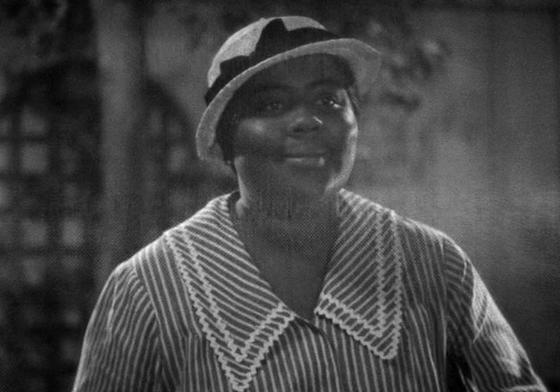

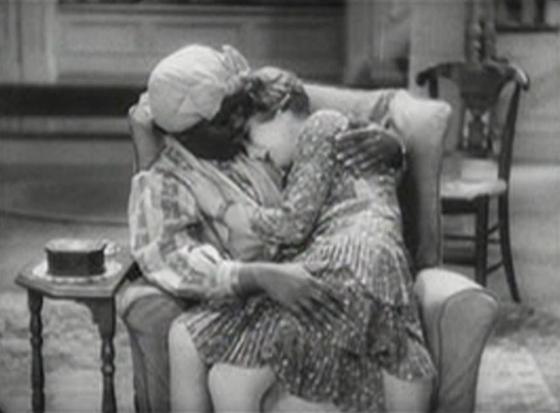
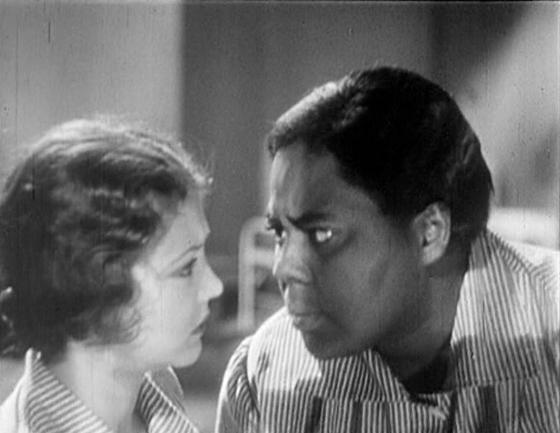

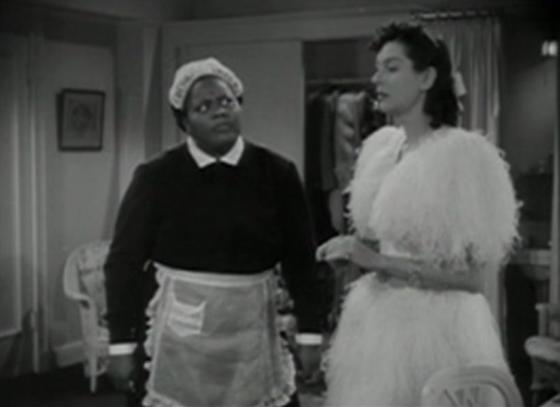








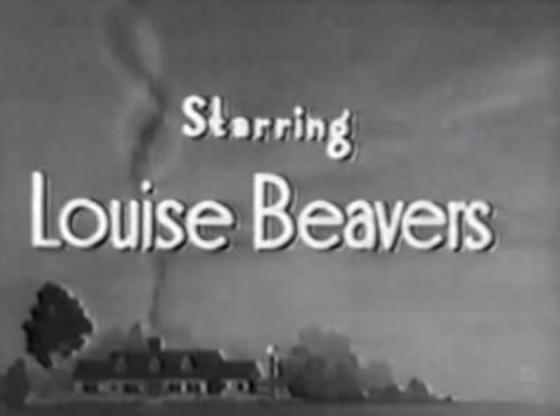
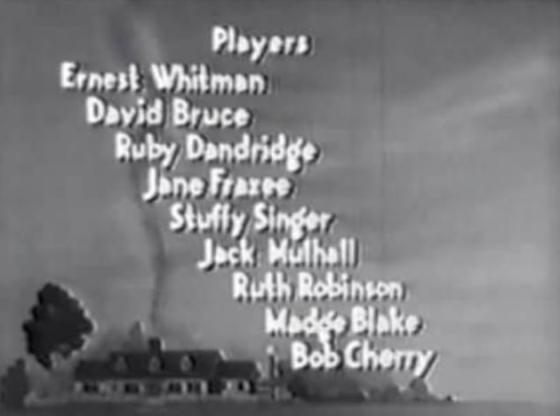




Hi Cliff,
Super review of a great actor. I must have seen Imitation of Life four or five times when I was young. Guess it is time to see it again, though. I recently saw a Have Gun Will Travel episode where the actress sung and was excellent……..I was sure it was Louise Beavers. But, when looking back, I found it was Odetta. The episode was The Hanging Of Aaron Gibbs. Yep, time to find it and watch it again. Thanks for a wonderful tribute to a great lady. Amazing how, sometimes great success can bring failure to a point. Never knew her story. Now I do, thanks again. Hago, KEITH
Glad you enjoyed the piece, Keith, and hoping it does inspire you to return to IMITATION OF LIFE for another viewing. I’ve probably watched it about once a year now since picking up the DVD 4 or 5 years ago and each time it’s a little better than I remembered.
In Andre Sennwald’s period New York Times review he mentioned how it “discussed the mother love question, the race question, the business woman question, the mother and daughter question and the love renunciation question.” There’s a heck of a lot going on here!
Great, thorough reporting, Cliff. I love Louise Beavers and have always preferred her version of IMITATION OF LIFE to Sirk’s. I’ve also added LADIES OF THE BIG HOUSE to my must see list!
Will, confession: I still haven’t seen Sirk’s. The sad part is that I own it because I have the DVD edition containing both films, but every time I pull it out to watch I go with the earlier movie. It’s just too good to pass up!
And I say that even though it’d place near the bottom on any Warren William score ranking I were to produce 🙂
LADIES OF THE BIG HOUSE is pretty awesome. I absolutely love Sylvia Sidney, so it’s kind of fun seeing her placed behind bars and Wynne Gibson does a great job of poking at her through most of it. Grab a copy off this iOffer seller.
Very interesting to learn more about Louise Beaver, Cliff – I haven’t as yet seen her version of ‘Imitation of Life’ (it is not available in the UK except on import) but have been hoping to do so since watching the Sirk version. Although I haven’t seen her in that one yet I have been impressed by her in several other films, where her quality as an actress comes across despite the subservient roles she has to play.
Thanks for making it to the bottom of this one, Judy! As I mentioned to Will above, I haven’t seen the remake myself, so I can’t really make the comparison either. I’ll put it this way though, if you enjoy movies of the ’30s I’m betting you’d be an instant fan of this one. Really surprised it’s not available in the UK … though not so surprised when I think of some titles I’m still waiting for in the US!
I tend to be surprised if a US film from the 1930s *is* available in the UK to be honest, Cliff! But luckily the imports are now cheaper than they used to be, and sometimes a title I’m after does turn up on TV!
That scene in “Imitation of Life” when Delilah asks the teacher if Peola “was passing”, she meant passing for white, not passing grades. Her meaning was very clear in the context of the scene.
Hi Muriel, I’m going to have to respectfully disagree but I think that’s what makes this such a great line.
I can’t believe Delilah would dare to ask the question in that context because she’d be spoiling Peola’s attempt to pass just by doing so–she’s a mother concerned about her daughter’s grades. But I also think that as viewers we’re absolutely supposed to read that into her question (that’s what I mean above when I mention putting words to Peola’s larger goal, i.e., passing for white). I also think that’s what makes the teacher stutter a moment before answering, she’s hearing the question as we are.
Thanks so much for reading and taking time to comment!